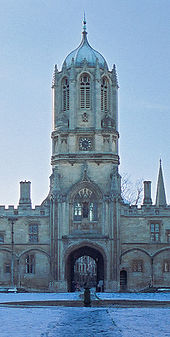
The Tom Tower – Christ Church Oxford [Photo by Toby Ord]
“The wily Censors have made sure they complained to the right part of the [Church of England’s] National Safeguarding Team” [Senior College figure to the Governing Board Trustees at Christ Church Oxford]
– ‘Thinking Anglicans’
“More Christ Church shenanigans”
5 COMMENTS
As I said before, “the fish stinks from the head down”
https://richardwsymonds.wordpress.com/2020/06/09/for-whom-the-bell-tolls-tom-tower-the-bell-tower-at-christ-church-oxford/
I am not in any position to express a view on what has taken place here, but offer for TA readers’ consideration the following factual extracts from Lord Carlile’s Report in the case of Bishop George Bell:
[B] SUMMARY OF CONCLUSIONS, LESSONS TO BE LEARNED AND RECOMMENDATIONS
19. My recommendations are as follows.
20. Core Groups are necessary for the scrutiny of cases, not least in order to ensure that decisions are taken consistently. Each such group should have one person nominated at the beginning as Chair who is expected to chair all meetings throughout. Groups should be established with as continuous and permanent a membership as possible.
21. The Core Group should have, in addition to someone advocating for the complainant, someone assigned to it to represent the interests of the accused person …
It was my understanding at the time that the Church accepted Lord Carlile’s recommendations with the sole exception of claims being settled subject to a confidentiality clause. Note the words “someone advocating for the complainant” and “someone assigned to it to represent the interests of the accused person … “
Thought experiment – what if the Visitor (The Queen) has just been holding off until she can appoint a recently retired Archbishop to the “enquiry” team (“enquiry” being whatever the correct term is for the Visitor instituting an investigation at Christ Church, which seems to have its own version of the English language as well as its own idiosyncratic time) … ?? I wouldn’t dare suggest this is likely, but anything is possible … and the potential for poison to spread is significant – both in the University and the Diocese (I am an incumbent in the Diocese of Oxford)
THE MEANING OF JOHN DONNE’S ‘FOR WHOM THE BELL TOLLS’
Apparently John Donne wrote this as a meditation, not a poetic verse, and I think we can see the unifying subject within each part of this, I have separated each section, it is normally written as one block of text, I did this to show that each sentence is an amplification, a development on the first assertion – that no man is an island:
“No man is an island,
Entire of itself.
Each is a piece of the continent,
A part of the main.
If a clod be washed away by the sea,
Europe is the less.
As well as if a promontory were.
As well as if a manor of thine own
Or of thine friend’s were.
Each man’s death diminishes me,
For I am involved in mankind.
Therefore, send not to know
For whom the bell tolls,
It tolls for thee.
For me this piece of writing is an expression of the great British contribution to the world of ideas, and this is that we are each unique, valuable individuals, we are each connected and an essential part of our societies, and the fabric of humanity.
There is a sense of genuine loss for each life, which potentially could have enriched us all.
The original emergence of what used to be called ‘Liberalism*’ have their roots in this kind of idea. If you follow each ‘verse’, or sentence, it builds on the idea that each individual ‘man’ is a precious part of the whole.
In essence the writer is calling for us to regard the waste of death, the sacrifice of men to war, as being as if our very continent is washed away, we are diminished by the absence of each individual.
John Donne is meditating on the value of each individual, he ends by asking not to wonder whose funeral bell is tolling, it might just as well be yours, he is inviting us to regard each life as being as precious as our own.
This is how the theme of this strikes me, no doubt a literary critic might wax lyrical on other aspects, but I think that is the essence of John Donne’s thinking when he wrote this.
*I have to say that what passes for ‘Liberalism’ among modern political circles bears very little resemblance to these original roots of the ideas about the value of the individual.
It seems, rather, to have become a form of authoritarian compulsion, based on quasi-virtuous excuses for compelling people to agree to accepted modes of language, and ways of thinking, without seeking agreement for them, or discussing their value in each context-as in ‘political correctness’ and other forms of post modern tyranny.
Originally, it is prose, and for me it remains beautiful, rhythmic prose.
It has been appropriated as a poem, but it is just a paragraph excerpted from one of Donne’s Devotions Upon Divergent Occasions: Meditation XVII .
The paragraph comes as the conclusion of a sequence of thought:
- A funeral bell is tolled to announce the death of one particular person, so it is “for” that person
- But the purpose of tolling a bell is that people hear it, so it’s “for” anyone who hears it
- (The paragraph in question) But ultimately each of us is not a solitary being: each one of us is a small part of a great community of beings, humankind. When another person dies, you too have lost a little bit of your own self. So that bell is tolling for you, and for everybody, as well as for the particular dead person.
From the quote, it means that when a bell tolls to announce the death of someone, you shouldn’t ask who it tolls for, that it tolls for you.
For details, follow this link: https://www.google.com/url?sa=t&rct=j&q=&esrc=s&source=web&cd=1&cad=rja&uact=8&ved=2ahUKEwjuvrzEiJLdAhWkCsAKHc1YBa4QFjAAegQIChAB&url=https%3A%2F%2Fen.wikipedia.org%2Fwiki%2FFor_Whom_the_Bell_Tolls&usg=AOvVaw0RfelvUdwYdmT7BalYPrQS

